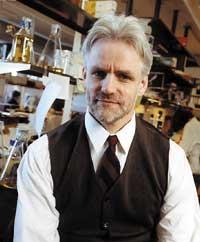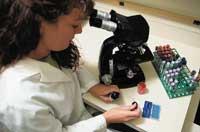Iceland's lesson: genomics, science between private and public

Fortune magazine articles indicate that over the next few decades "everything, both gender and disease trend" will find genes that determine it and are "commercially valuable" (and patentable), and that new "revolutionary gene-based drugs" will be created. Many new startups claim to be the first to sell genomic information to pharmaceutical companies.
Genomics studies the complexity of the total genomes of living beings: it is science and technology that develops resources to investigate genomes, or structures of genetic supplies of living beings. A common tool would be the comparison of genomes between different living beings (for example, the path adopted by the company Celera de Craig Venter), another the study of genealogies, as we will see below. The common goal is to find genes.
Looking for genes...The word gene was invented by Johannsen at the beginning of the century to reflect the elements of inheritance announced by Mendel. His work was rediscovered in 1900, after thirty-five years of oblivion, and he had a great impetus to research the material execution of inheritance. With an ambitious objective, progress was made slowly: soon the presence of these genes on chromosomes was observed; in the 1940s heredity was linked to the DNA molecule; in 1953 the structure of the double helix of the DNA molecule was discovered; in the following years it was revealed what genetic information is and how it is used intracellularly; in the 1980s and 1990s sequences of the genomes finally began. All these facts are the milestones of an important investigation, the great steps, of course, but, however, we cannot say that they have been found.

It is now known that genes are not the isolated particles suggested by Mendel's work. On the contrary, genetic matter is chained into long molecules formed by nucleotides. The chain consists of four types of accessories: adenine, thymine, guanine and cytosine, whose intracellular succession is used in the construction of proteins by a code. The gene is therefore a nucleotide chain that represents the one-dimensional chain of the protein. But the genes of living things cannot be seen through a microscope or other instrument. Gene research is more complicated:
o On the one hand, because not all DNA has the function of encoding proteins, the parts that are decoded are mixed with many others on chromosomes. For example, 97% of human DNA does not encode anything. What does this DNA do? This is known as "junk DNA" and its function is not yet well known.
- On the other hand, the term gene has often been used, even among biologists, to explain the inheritance of characteristics superior to proteins, that is, as the phenotype -eye color, ability to skate predators, etc.- or as a determinant of diseases. The inheritance of this type of characteristics is not found in an easily localizable succession, but can also be found in different chains of multiple chromosomes.
- Finally, among the conventional genes that encode proteins there is a great variety and different DNA series that encode the same protein in different life forms, even of the same species, can appear. The law is diversity in life.
To do this, genomic companies that look for genes have been created. It is a double hope: on the one hand, to be able to analyze to the molecular level the nature of life (and of the human being) and, on the other, to develop tools that can modify the molecular structure (for example, in case of disease). In this article we will explain, with a particular case, the scientific and social problems to find genes: The case of Iceland.
...a new database in Iceland
Iceland is one of the oldest countries in Europe and one of the most recent. Although it did not have full independence until 1944, the Icelanders are proud that the first Icelandic parliament was formed in 930: Althingia. Perhaps the town of Iceland is the only one that knows its origin in Europe, since its inhabitants arrived in historical times and there they did not find anyone before. Immigrants, especially Norwegians, but also Swedes, Danes and Irish, began attending the event in 874, when all the data on population evolution have remained diligent. Today there are 275,000 inhabitants, some of whom can relate the traces of their family to the former.

Life was not easy for the Icelanders. Today's society, despite respect for the past, is rich, hardworking and modern. With the fishing fleet acquired after World War II, the largest industry in Iceland was built and with the benefits of cod its schools, social security and public health were built.
A new source of benefits is now envisaged for the people of Iceland: their genetic homogeneity. This is because they are descendants of a few pioneers who come to an isolated place. Therefore, due to the reliability of genealogical data and medical histories, it has been considered that it will be easier to define the genes associated with certain diseases here than in places with greater heterogeneity, such as the United States or the European continent.
Kari Steffanson, an Icelandic doctor working at Harvard, detected the suitability of the population of Iceland to be the summit of this research. In the United States and adding its capital, in 1996 he founded the company deCODE genomics. Returning to his country, he asked the Government of Iceland for authorization to carry out a new project: to build the world's first national database, unifying population genetic data, family trees and medical records. The objectives of the company deCODE are to discover the genes of certain diseases and the objectives of drugs and diagnoses through genetic and medical research; to deepen knowledge about health and disease through modern computer technology [data-mining]; and to focus this knowledge towards the development of products and services for sale to the international healthcare industry.

This project sparked a great debate between society and the Icelandic parliament. A team of scientists, doctors and psychiatrists organized the Mannvernd association "Icelanders are committed to ethics in medicine and science." Finally, in 1998, an Icelandic parliament law authorized the deCODE company to develop a database under certain conditions. Although this law introduced a number of modifications requested by the Mannvernd association, it was not entirely suitable for critics. The most serious problem is that, although the law establishes a series of measures to ensure data privacy, the requirement of informed consent is not met in all cases. For example, Iceland's health stories enter the database without asking the individual for permission. Non-conforming people may be left out of this project, but the entire previous story will be in the database.
Supporters of the database insist on the need for a realistic data heritage, but critics consider that the behavior of this company does not conform to the Declaration of Helsinki. This 1964 agreement is the world's most recognized driver for medical research with human participants. The new declaration, approved in October 2000, shows more than ever the requirements that physicians owe to research participants. Informed consent issued free of charge, if best written, must be obtained from all participants in the investigation and persons who cannot grant it may only access the investigations under special conditions. This point can be understood as a medical warning to pharmaceutical companies that cannot have "captive" populations (often in the Third World) for human genetics experiments.
Public and private sector in science

Biotechnology is changing medicine, seeing genes as a social good, has given economic value to DNA (deCODE genetics regularly informs its shareholders about the company's contribution increases). The problem is how this social good is distributed. Although technology has made organ trade possible, most believe that this behavior is not correct: like blood, organs should be given voluntarily.
On the other hand, is it the same to give an organ to someone to give a sample for genetic research? The donated blood or organ would fulfill its biological function in the recipient. On the contrary, the sample granted for genetic research will not in principle fulfill biological functions, but will be used for the study of "information".
This information can be stored electronically (i.e. copied to the computer) or biologically (as sample). Although the data entered on the computer raises questions about privacy, the samples that are maintained may raise some more serious concerns if once the authorized research by the donor has been completed they could be used repeatedly for other purposes.
The DNA molecule does not act by itself (proteins built by its chain will affect the organism), but its structure is replicated by making copies, both in nature (cellular reproduction process) and in the laboratory (cell culture). Therefore, this molecule can reveal the historical identity of living beings.
Like fingerprints, you can identify the person (by genetic markers). But unlike fingerprints, in DNA you can find other human data, especially related to your family. These relationships can be used for genetic research, to isolate the molecular factor following the trace of the phenotypic heritage of diseases.

Therefore, it seems that genomic research, especially in the case of Iceland, is crossing borders between the private and the public. On the one hand, individual rights in conflict have not yet been fully determined and it is not clear whether genes should be considered as individual or collective property, that is, whether their property is individual or whether they are the property of the whole society. On the other hand, the advertising of knowledge has always been the ideal of science, which does not correspond to that knowledge is only used by small groups or private companies.
On March 14, 2000, Clinton and Blair requested that "pure data on the human genome, the human DNA sequence, including its variants, be given free of charge to scientists of any kind," so that the human genome is a public good of common use.
For this reason, "the genome is a new starting point for all", says the president of the Association for German Research in a Newsweek article (30-10-2000) in Bonn. Therefore, countries that did not have the biotechnology industry can start their research at the same level as the rest.

As a scientific knowledge, what is found about the human genome should be public (open to anyone), but the interests of the pharmaceutical industry have made it a source of benefits (for example, by patenting genes or genetic testing). On the other hand, the data collected by public health are also public (in short, protected by the Government) and have become private. That is, therefore, the problem of Iceland: that the private data of the individual has been put in danger, because the secrets can be disseminated and has not been done for the benefit or benefit of all, but for private enterprise.
Lesson of Iceland
Databases are being organized around the world to find genes. The first has been from Iceland, but it is also being prepared in Estonia and other countries. In recent years advances in genomics have been really important and concerns: Do advances in medicine benefit all human beings? Or only some private companies?
Iceland shows that today all populations in the world are subject to genomic research. In short, these companies only owe explanations to shareholders. Companies have reached agreements with governments to obtain population data, with a promise that will bring a common good. And without knowing whether it will work or not, very efficient bioinformatics tools are developed, not only to find the DNA sequence of biological matter (tissue samples) but also to cross that information with medical and genealogical data. We don't know if that's going to be good or bad: if we're just going to see cancer cure or the end of privacy. However, in this new science, academia does not rule, but the high tech industry, rather than the scientific community, is a market in which the new image competes with each other.

Some warn that this boom will not benefit populations that provide raw material, but investors who have contributed capital. As the famous biologist Richard Lewontin wrote: "Those in favor of the company deCODE claim the Icelandic nationality of the company and its founder, recalling the nationalism, pride and interests of the Icelanders. But it’s a “paper company” from DeCODE Delaware… Some critics have claimed that all Icelanders’ medical needs would be met better and not just those of DECODE, if they had free access to the database. In short, science does better if information is shared freely" (The New York Times, 23-1-1999).
It is often said that, in addition to literature and art, science is culture. This is true and disclosure plays a fundamental role in the development of the scientific education of the population. But that knowledge of science is not just an elegant supply. In addition to being part of the culture of our time, citizens must know the science to make decisions that matter to us a lot. According to a survey published in an Icelandic newspaper, only 13% of the population had understood the database law well (Morgunbladid, 3-7-1998). And given the new genomics, these decisions will become increasingly important, both in the public and private spheres.
Why a genetic database in Iceland?
After World War II the medical histories of all Icelanders have been preserved.
- After World War II, textile samples have been taken and stored by much of the population.
- Family trees from most of the population have been developed.
- For a thousand years there has been no immigration.
- The standard of living of the population is very good and similar. Source: CHADWICK, R. "The Icelandic database - do modern times need modern sagas? ", British Medical Journal, 319 (August 14, 1999).





